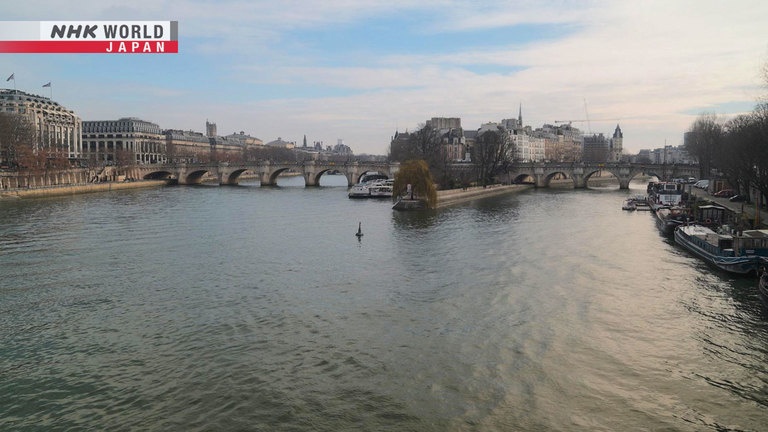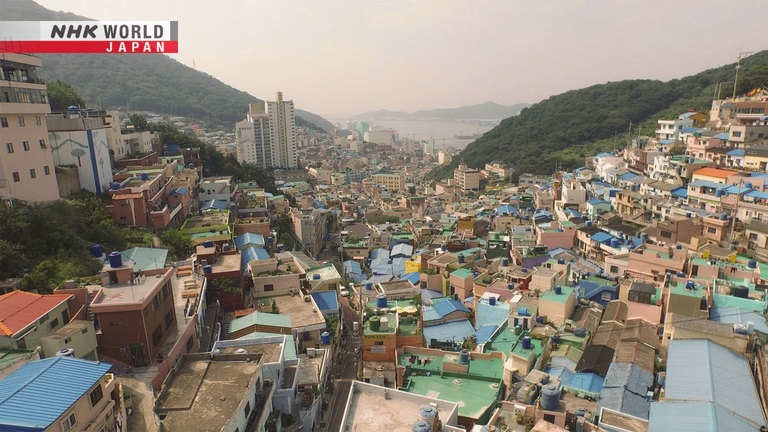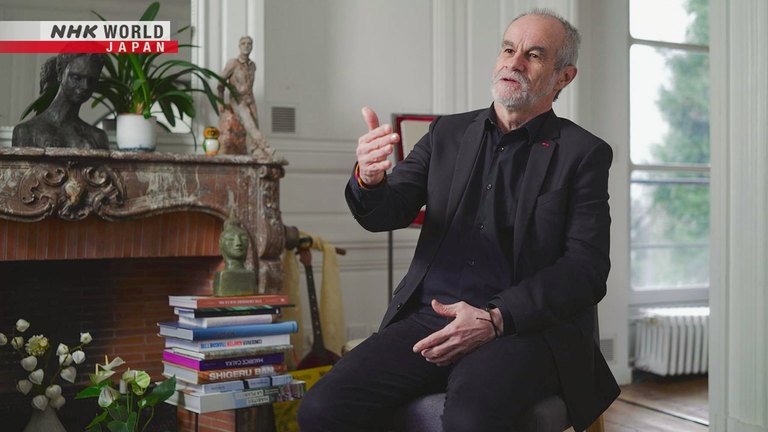The 15 Minute City: Carlos Moreno / Professor, IAE Paris Sorbonne Business School
Scientist Carlos Moreno's radical proposal to cut global warming is taking off worldwide. He wants cities reshaped as neighborhoods so that we live and work within a 15-minute walk or cycle ride.




Transcript
Direct Talk
The morning rush hour
brings 180,000 vehicles into Paris every day,
pumping greenhouse gases into the atmosphere.
Car journeys like this
account for a fifth of all carbon emissions,
driving catastrophic global heating.
If cities like Paris are to reach their goal
of being carbon neutral by 2030,
car journeys will have to fall by half.
Could the solution lie
in the way cities are designed?
Scientist and urban planner
Professor Carlos Moreno
believes it does.
He says the answer is to reshape cities
to bring work and home closer together.
This would radically cut
the need for commuting.
His idea is known as the 15-minute city.
The 15 Minute City
Professor Moreno is a scientist specialising
in complex systems and innovation.
He is calling for a change
to the way cities are designed
to improve the quality of life
and reduce reliance on cars.
For decades since the 1940s
urban planning in cities was dominated
by architects like Le Corbusier.
Le Corbusier believed a successful city
had to be a fast-moving city.
The motor car became
an integral part of city life
and home and work took place
in separate zones linked by highways.
Cities became specialised
with business districts just for work,
Carlos Moreno
Professor IAE Paris Sorbonne Business School
with residential areas,
with areas for leisure activities,
places for richer people,
places for people with less money.
In the end the city became
a collection of different locations
far from one another.
And people said
"Well we're going use these highways
and streets to drive cars through."
So the privately owned car
became a symbol of freedom.
Moreno's 15-minute city
is a call for architects and city planners
to change the way cities are shaped.
The aim is that people
should be able to reach their place of work,
medical services, shops,
cultural and sporting activities
in their own neighbourhoods
within a 15-minute walk
or cycle ride from home
So the 15-minute city is a more human city,
a greener city
with many more shops
and activities throughout.
15 minutes in a compact area
because it allows you to walk or bike
to get the basic essentials.
What I mean is
putting an end to compulsory trips
and moving towards making trips by choice.
Moreno is convinced that
planning cities around the idea of proximity
would not just cut car journeys
but could help reduce
social exclusion, inequality
and improve the quality of life.
Our quality of life has deteriorated
because of our use of extreme resources -
oil and concrete.
The economy too has deteriorated
because poverty has moved into cities.
And social exclusion has set in
because cities have become very unequal.
These are three different ways in which
modern cites are affecting us:
ecologically, economically
and socially.
After the Paris agreement
to limit global warming,
Paris Mayor Anne Hidalgo
convened mayors from around the world
to discuss practical ways
to cut carbon emissions
including Moreno's 15-minute city concept.
Paris immediately
launched measures to reduce cars
and encourage walking and cycling.
A hundred city centre streets
have been pedestrianised
and private cars banned from key roads.
One of Hidalgo's best-known steps
was to ban traffic from
a 3.3-kilometer road along the River Seine.
The mayor of Paris has always
wanted to transform this city
to remove the highways that cross the city.
The road along the River Seine
has now become an urban park.
It's a very big transformation.
But it was the pandemic that
transformed prospects for the 15-minute city.
With cars and residents off the streets,
carbon emissions fell dramatically.
And a permanent change
occured in people's attitudes
to their neighbourhoods and to their lives.
People discovered something completely new -
using time effectively.
Since there was less travelling,
there was more time.
Many people rediscovered their family
and their neighbours.
We got to know who lived in our buildings.
We walked around our neighbourhoods,
we discovered parks,
green spaces and local shops.
It was the start of something new:
how to stop making compulsory trips
- which account for 80% of daily journeys -
to focus on something new -
doing our normal activities
while making good use of our time.
When Mayor Hidalgo's ran
for re-election in 2020,
she appointed Moreno
as her scientific advisor
and pledged to put the 15-minute city
at the heart of Paris' urban plan.
Her first step has been to repurpose
the city's own buildings for multiple uses.
Paris is undergoing a revolution
that the mayor Anne Hidalgo
calls the "big bang of proximity."
Sustainable buildings
like the new Stream Building
were commissioned to bring
all activities of urban life under one roof -
offices, overnight stays and shops.
Solar panels generate power,
plants in the roof garden
will supply herbs for its cafes.
In the basement grey water
is recycled into soil for the garden.
This former local government building
has been rebuilt as a 15-minute complex,
with co-working space, a luxury hotel,
social housing, a creche
and bike racks for use by local residents.
Today it is a whole 15-minute
neighbourhood called Felicite
in which there is a market,
a hotel, social housing
and cultural activities.
And it's a public space;
you can go in and out.
Carlos Moreno was born in
Colombia, South America.
His father was a former landless peasant
who became an accountant.
The young Carlos excelled at school
but was forced to flee the country
during a state crackdown against
the urban guerilla movement he'd joined
to fight for electoral democracy.
When I was warned
that I was next on the list,
I immediately left my town
and took the first plane
that brought me to Paris
where my friend was waiting.
And I was one of the first
political exiles to come to France.
Arriving in Paris aged 20,
Moreno's talents in maths were
quickly recognised by French universities
He rose to become a successful digital
and robotics entrepreneur,
designing drones for the
nuclear power industry.
The possibility of using his inventions
to revolutionise city infrastructure
brought offers from big business.
Suddenly Moreno was on the world stage.
My technology was very successful
and so my startup was bought
by a French multinational
who adopted my technology to make it global.
For five years, I was the scientific advisor
to the president of this company
of 100,000 people worldwide.
It was incredible
because I could travel the whole world
and look at everything
that was going on in cities.
Moreno's belief in the public good
never left him
and he departed the multinational
to work in academia
on his idea for sustainable cities.
Now as a scientific advisor
to mayors around the world,
his concept is being adopted
in five continents -
from Melbourne Australia
to Edmonton in Canada.
In Busan, South Korea,
the mayor is investing 10 billion dollars
to reshape the city based on Moreno's work,
starting with 48 children's libraries,
parks and cultural centres.
The mayor of Busan took the concept
of the 15-minute city.
He used an open source of all the work
by my team at the Sorbonne.
He designed his project
and he implemented it.
During Covid I couldn't travel
so we worked remotely.
I went there in October 2022.
It's amazing what they've done.
In Latin America, the mayor of Buenos Aires
is converting empty office blocks
into a 15-minute city.
In Sousse, Tunisia,
they too have adopted the idea.
In Chengdu, China
the city's leaders embraced the concept
of proximity with unexpected results
They loved the idea
and they developed
the first master plans for proximity.
Then the Chinese authorities wanted
the concept to spread to other cities.
Today 52 Chinese cities
are implementing the concept
they call 15-minute community life circles.
Already much lauded in France
for his work on smart cities,
Carlos Moreno was recognised
internationally for his work,
receiving the Obel Award
for architectural achievement in 2021
and in 2022 the UN-Habitat Scroll of Honour.
On social media it's another story.
In February 2023
residents of Oxford, UK
protesting against council traffic curbs,
denounced the 15-minute city
as an attack on freedom
after climate change deniers
used social media to condemn the concept.
Moreno says
some criticisms must be taken seriously.
There are people who say
Moreno's 15-minute city is a nice idea
but not everyone can work remotely.
What about the cleaning lady?
What does the worker do or the mason
who can't work remotely?
And there are others who say:
without cars in the city,
how do we get around?
If I am old, or a pregnant woman
with children on my own
which also happens in life,
Moreno is going to make me go by tube or bus.
But what if its nighttime?
These are comments we must pay attention to.
Carlos Moreno believes
that only elected city leaders have the power
to bring about the changes that are needed
to the way we live our lives
if we are to stop
catastrophic global heating.
In the hands of elected leaders,
he believes that
the 15-minute city even has the potential
to reduce inequality
and segregation in cities.
The 15-minute city is
aiming to change our way of life.
It's important to acknowledge that
we've been living this way for 70 years -
70 years in which people have felt
that it's completely normal
to lose time and that having a car
just for myself is normal
What do we want to do?
We want it to be an urban policy
led by city leaders.
If it's a city policy, what will we do?
In wealthy areas we'll build social housing,
we'll build creches and sports facilities.
We'll mix things up.
That is the secret of success.
So is the 15-minute city
a concept whose time has come?
Even the owners of Paris office blocks
are exploring its merits.
For Moreno embracing proximity will be the
way to bring humanity back into urban life.
All over the world business districts
are in free fall.
They are emptying.
The business model of
these districts is in free fall.
So the owners of these buildings are saying
"Ah. No one's coming anymore!"
"We're building these towers
but no one wants to rent them."
"Hello Carlo Moreno?
I've heard about the 15-minute city.
What is it?
Can you come and explain it to us?"
What is happening today in this sphere?
They are coming to ask us
how to find another business model,
another economic model.
And that's what's going to produce change.
Humanity.
We want a city that rediscovers
the humanity it's lost.
Humanity!